TPO -> The TPOs of Hungary
The TPOs of Hungary
By Tony Goodbody
Start and finish dates: c1867 to c1996
Travelling post offices began to run in Hungary in 1867 and the earliest known postmarks appeared the following year.
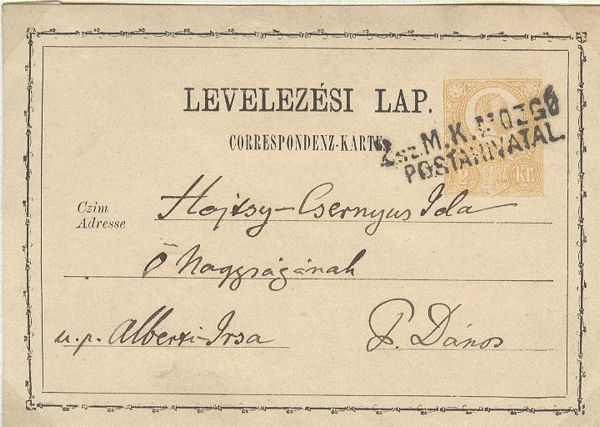
The Magyar word for travelling post office is mozgópostahivatal which is usually shortened to mozgóposta. Thus the postmark on the card shown above reads "2sz. M. K. MOZGÓ/ POSTAHIVATAL." When translated this becomes "No.2 Hungarian Royal Travelling Post Office." The route was Wien-Pest (or vv.).
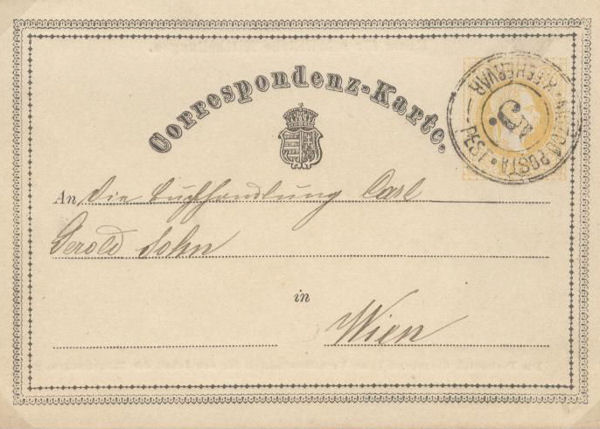
In 1869 a circular postmark was introduced with the route number in the centre and the route round the edge. The cover above shows a postmark reading MOZGÓ POSTA/ K. FEHÉVÁR - PEST. "K" is short for "Károly." Károly Fehévár (German name: Karlsburg) was later renamed Gyulafehévár but is now in Romania and known as Alba Lulia, 466 km. from Budapest.
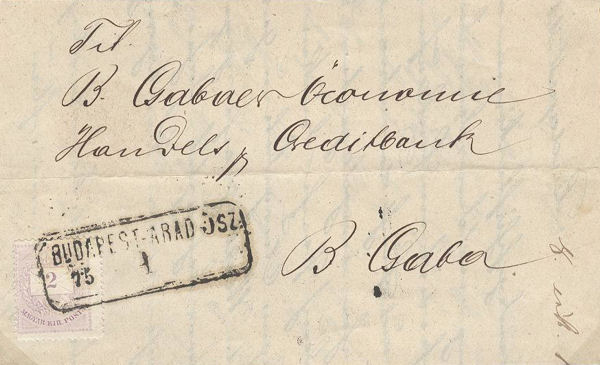
The first dated postmark appeared in 1873. The cover above shows Route 5 which had been shortened to Budapest - Arad, 255 km. Arad too is now in Romania.
Circular dated marks first appeared in 1874. The following piece shows the postmark for route 10, Kassa-Budapest, used on a wrapper. Kassa (Kosice) is now in Slovakia. The German name was Kaschau.

Larger dated postmarks appeared in 1880 (below, route No. 122). This is what the Americans call a facing slip. By this time the number of routes had grown enormously, the highest numbered route to use this type of postmark was No. 208.
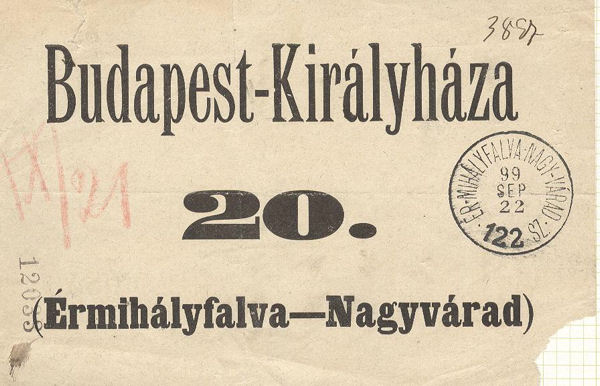
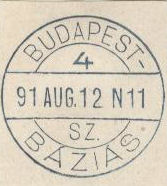 Yet another type of circular datestamp was introduced in 1890 (adjacent, which appears to be a proof book impression,
although the date of introduction is given as 4th August, 1891).
The year 1892 saw the introduction of a
cds incorporating a crown, which lasted for many years and whose numbers went up as far as 478.
Yet another type of circular datestamp was introduced in 1890 (adjacent, which appears to be a proof book impression,
although the date of introduction is given as 4th August, 1891).
The year 1892 saw the introduction of a
cds incorporating a crown, which lasted for many years and whose numbers went up as far as 478.
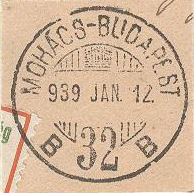
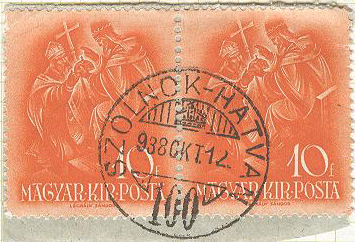
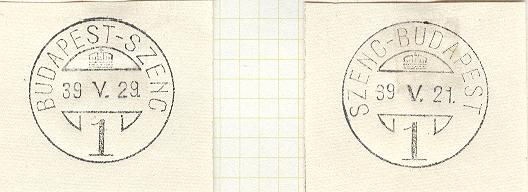 Smaller postmarks were introduced in 1927, An example is this pair of proof book impressions, issued on 20th May, 1939, for the
Budapest - Szenc route. Szenc is Senec in Slovakia and the route was made possible when Hungary re-occupied part of its
former province during the so called "Visszatert" (Homecoming) period (1938-1945).
Smaller postmarks were introduced in 1927, An example is this pair of proof book impressions, issued on 20th May, 1939, for the
Budapest - Szenc route. Szenc is Senec in Slovakia and the route was made possible when Hungary re-occupied part of its
former province during the so called "Visszatert" (Homecoming) period (1938-1945).
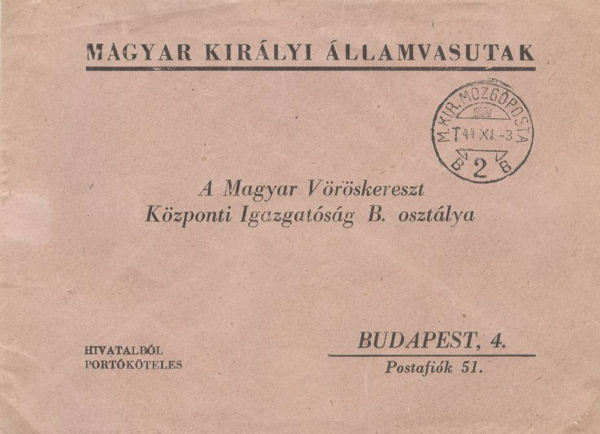
During and after World War II postmarks without any indication of the route were in use, making it much more difficult for the philatelist. Illustrated above is a State Railway Co. envelope sent to Budapest without charge. The letter "T" before the date indicates the direction. Thus T = Térti Járat = Return journey or "Up". The letter "M" before the date would stand for Menet Járat = Outward Journey or "Down" (also see End of the Line).
Mailguard marks and Second Class Travelling Post Offices
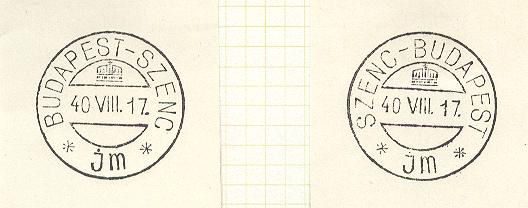 Mailguards go by various names and abbreviations; the most frequently met with is "jm" meaning JEGYZÉKELÖMENET which
when translated becomes "Conductor Post Journey".
Mailguards go by various names and abbreviations; the most frequently met with is "jm" meaning JEGYZÉKELÖMENET which
when translated becomes "Conductor Post Journey".
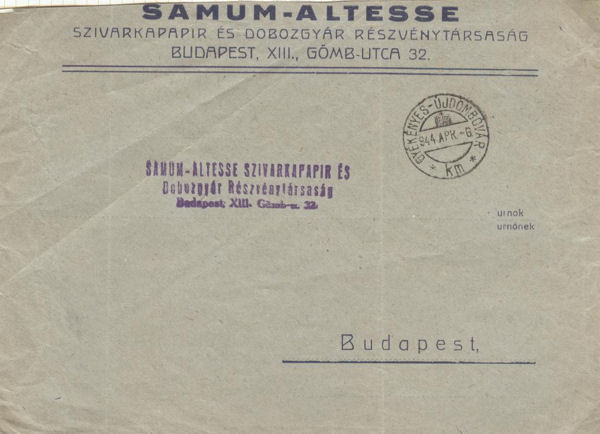
The postmark on the cover above reads "GYÉKÉNYES - ÚJDOMBÓVÁR/ km". The letters "km" are the abbreviation for "közvetito menet" which when translated literally mean "intermediate journey." This appears to be a very odd translation until it is remembered that the Austrian word for a mailguard is "gesamtpostkurs" which literally means "complete postal journey." On this flimsy evidence the author submits that the letters "km" indicate a second class travelling post office.
The author knows of no comprehensive work in English on the TPOs of Hungary. For a list of references the reader is referred to the Bibliography section of the Railway Philatelic Group website and for a more complete list of terms you are referred to the "Terms and Abbreviations" section of the same website.
The End of the Line
This author does not know the date of the last TPO to run in Hungary but in 1996 a "Nostalgia Trip" took place with TPO No. 2 which by that time had been considerably shortened to the route BUDAPEST - VAC. The reader will notice the letter "M" before the date indicating Outward Journey or Down.
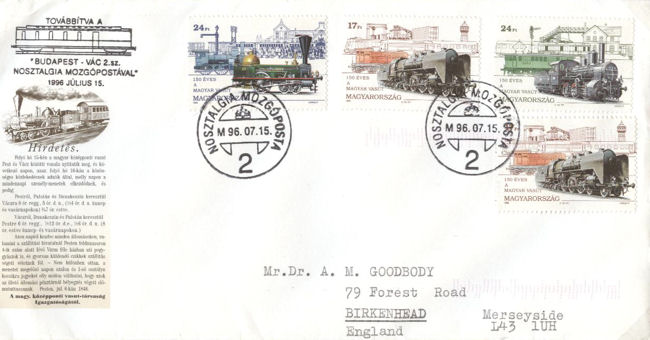
Catalogue of Hungary TPO Marks by Lutz Ihnken
A catalogue has been made available free of charge by Lutz Ihnken to promote the available knowledge of the the TPO marks of Hungary and is gratefully made available here for the benefit of TPO and Seapost Society members.

